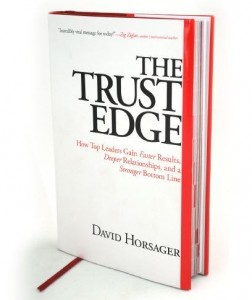Trust is like change in a leader’s pocket. Each time you make a good leadership decision, you earn more change. Each time you make poor decisions, you pay out some of your change to the people.”
 I was recently talking with a high potential young nurse leader who had been asked to do something that was clearly fraudulent by her supervisors. She is devastated on so many levels as an outcome of this experience. The organization has a budget shortfall and the request is intended to rectify poor financial decisions that were not made by her. She wonders why anyone would ask her to do something that was both wrong and ultimately she could be held liable for if it was discovered. She plans to say no but her trust in her leaders and her organization is shattered perhaps beyond repair. In his business bestseller, “The Trust Edge: How Top Leaders Gain Faster Results, Deeper Relationships and a Stronger Bottom Line.”, David Horsager makes the important point that trust flows from individuals, not from organizations. Without trust, leaders lose influence and the ability to retain their team members.
I was recently talking with a high potential young nurse leader who had been asked to do something that was clearly fraudulent by her supervisors. She is devastated on so many levels as an outcome of this experience. The organization has a budget shortfall and the request is intended to rectify poor financial decisions that were not made by her. She wonders why anyone would ask her to do something that was both wrong and ultimately she could be held liable for if it was discovered. She plans to say no but her trust in her leaders and her organization is shattered perhaps beyond repair. In his business bestseller, “The Trust Edge: How Top Leaders Gain Faster Results, Deeper Relationships and a Stronger Bottom Line.”, David Horsager makes the important point that trust flows from individuals, not from organizations. Without trust, leaders lose influence and the ability to retain their team members.
As he researched organizations in his work, Horsager found that trust is the competitive edge shared by great leaders and great organizations. Trust, he suggests, doesn’t happen overnight. It is instead like a forest that grows over time but can be burned down with acts of carelessness. In his work, Horsager has identified the eight pillars of trust that are key attributes of successful leaders:
1. Clarity: People trust the clear and mistrust the ambiguous.
2. Compassion: People put faith in those who care beyond themselves.
3. Character: People notice those who do what is right over what is easy.
4. Competency: People have confidence in those who stay fresh, relevant, and capable.
5. Commitment: People believe in those who stand through adversity.
6. Connection: People want to follow, buy from, and be around friends.
7. Contribution: People immediately respond to results.
8. Consistency: People love to see the little things done consistently.
Horsager suggests that when leaders learn how to implement these pillars, they enjoy better relationships, reputations, retention, revenue, and results. The Trust Edge unveils how trust has the ability to accelerate or destroy any business, organization, or relationship. The lower the trust, the more time everything takes, the more everything costs, and the lower the loyalty of everyone involved.
This work is important today in health care where there is so much uncertainty and trust in fundamental to the work of nursing. The trusted leader is followed. When health care organizations are trusted brands, people will choose to use them over competitors and tell others. It is trust and not money, that is the currency of leadership, business and life.
Read to Lead
Horsager, D. (2012). The Trust Edge:How Top Leaders Gain Faster Results, Deeper Relationships and a Stronger Bottom Line. Free Press.


 LinkedIn
LinkedIn Instagram
Instagram